TODOS LOS ARTÍCULOS DE ESTA PAGINA SON TOMADOS DE: Chess.com. Algunos de ellos están en ingles.
Artículos > Finales
-

5 recursos mágicos en los finales de ajedrez
Por alguna razón a la mayoría de jugadores de ajedrez, tanto principiantes como jugadores avanzados, les atraen más las aperturas que los finales. Tal vez la idea de conseguir una gran posición en pocos movimientos resu... -

Los finales de dama de Leinier Domínguez
Un evento como laPRO CHESS League (Liga Profesional de Ajedrez 2017), que reúne a algunos de los mejores jugadores del mundo (Carlsen, Caruana, Nakamura, etc) seguro que sirve para que se produzcan grandes partidas. Y esto significa q... -

Consejos para no odiar los finales en ajedrez
"Detesto los finales"dijo Dawid Janowski más de 100 años atrás. Según su opinión, una buena partida de ajedrez debía estar ya decidida en el medio juego. Hoy en día, una opinión... -

Carlsen's Unlucky Endgame
Inthe age of endgame tablebases and enginesrated 3300+, it is difficult to imagine a relatively basic endgame thateven grandmasters have difficulties to play and evaluate. The endgame "two bishops vs. a rook" with all pawns on ... -

-

Study Plan For Advanced Players: Endgames
Target Skill Range:AdvancedPath (Rated 1800-1999) Tasks: Develop "endgame thinking." Master king activity in the endgame. Understand the winning and drawing chances of opposite-colored bishops. Improve your understanding of en... -

Opposite-Colored Bishop Endgames
Everyone’s had the unfortunate experience of playing an opposite-colored bishop ending. Like a mirage, you never know how they got there, and you definitely didn’t intend on it. Nevertheless, they have arrived. These mirages don’... -

Typical Rook Endgame Mistakes
Endgames should be simple. Right? With a majority of pieces removed from play, calculation becomes minimal. Wrong! At one time or another, you may have found yourself on the losing side of a winning endgame. Perhaps you've been fortunate e... -
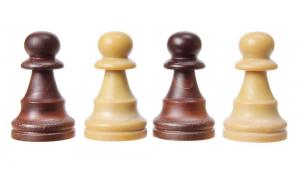
Pawn Endgames: A Practical Guide
Let us begin with a small challenge. Take a look at the following diagram: It is the starting position, stripped of all pieces except kings. If you managed to examine it without a yawn, eye roll, or grimace, you have passed the test. ... -

In Pursuit Of Zugzwang
Zugzwang in chess seems like a simple concept: being forced to move even when it's disadvantageous. To me, zugzwang is thesaudadeof chess; a straightforward idea on the surface, but a profound and fascinating concept on the in... -

The Two Rook Endings You Must Know
The study of theoretical endgames is a necessary evil. For most players, it is a rather torturous experience simply because there is no room for innovation or creativity. However, as any strong gandmaster will tell you,there are several th... -
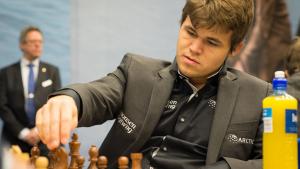
Magnus Carlsen's Best Endgame Wins
Last week, we dissected Magnus Carlsen's positional mastery by examining two of his finest strategic victories. However, modern chess demands universality, and it is impossible to become world champion and attain the highest rating in history thro... -

Clash of Champions Finale: Carlsen vs. Anand
After winning the Mexico City tournament in 2007,Viswanathan Anand had become the world champion. Anand defended his title for a first time by defeatingVladimir Kramnikin the 2008 match held in Bonn, Germany, He again defende... -

Clash of Champions: Anand vs. Kramnik
After defeating Veselin Topalov in their 2006 match, Vladimir Kramnik was officially the undisputed world champion -- although he had been largely regarded as such since his 2000 match victory over Garry Kasparov. In 2007, a round robin tourname... -

How to Understand Pawn Races
Many beginners tend to assume that pawn endings are easy to master. After all, with material so limited, how hard can it be to untangle the complexities of any given position? The answer, as any endgame maven will tell you, is unequivocal:... -

Clash of Champions: Topalov vs Kramnik
So far, I have only been covering the world championship matches where the title actually changed hands. However, since this series has turned into not just a look at the instructive and beautiful endgames played at the highest level of chess, b... -

Clash of Champions: Kramnik vs. Kasparov
By 1990, Garry Kasparov had done what nobody had done before since the creation of the world championship: defended his title multiple times against the clearly best challenger. All in all, he and Anatoly Karpov played five quite grueling matches ... -
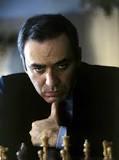
Clash of Champions: Kasparov vs. Karpov
With Anatoly Karpov having "inherited" the world title, he was eager to win as many tournaments as possible to prove that he was worthy of the title. And this he did. Besides winning such tournaments as Milan 1975, Las Palmas 1977, Bugojno 1978... -
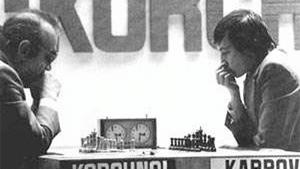
Clash of Champions: Karpov vs. Korchnoi
After Bobby Fischer won the world championship in 1972, he was a hero -- not just in the U.S., but for chess players everywhere. But being a hero is not for everyone. Always hard-working and ambitious, Fischer had fought more against himself tha... -

Clash of Champions: Fischer vs. Spassky
In our exploration of the endgames from the world title matches, we have now reached the most famous of all matches -- the so-called "Match of the Century." Besides the unusual and brilliant character of Bobby Fischer, this match is so well reme... -

Clash of Champions: Spassky vs. Petrosian
For the first time since Alekhine, there was a world champion not named "Botvinnik" who was also not merely renting the title for a year. The Armenian named Tigran Petrosian held the title of world champion, with his unusual, "left-handed" style o... -
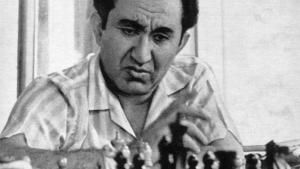
Clash of Champions: Petrosian vs. Botvinnik
Mikhail Tal had come and gone; the older Mikhail (Botvinnik) was still on the throne of chess. But in 1963, another archetypal chess player which had heretofore not been seen made his appearance. Tigran Petrosian was born in 1929 in Tbilisi, Geo... -

Clash of Champions: Botvinnik vs. Tal (1961 Rematch)
Throughout the second half of 1960 and the first few months of 1961, the world had an unusual sort of champion. Throughout most of the history of chess, its world champions have been -- at least to a large extent -- pragmatic and balanced players.... -

Opposite colour bishops with rooks
Marzaduri R- IM Sveshnikov V. 1/2 This game was a draw, but I found a nice plan to win for white, I share it with you. -

Clash of Champions: Tal vs. Botvinnik
Mikhail Botvinnik had regained the world championship in 1958, but soon after the chess world's attention was captured by the rapid ascent of a young player with an unusually sharp and creative style: the Latvian Mik
Artículos > Teoría de Aperturas
-

La Apertura Inglesa... ¡en 15 minutos!
Continuamos nuestro reto de mostrar vídeos breves en los que dar algunas claves introductorias a determinadas aperturas. Toca el turno de la más importante de las aperturas de ajedrez de flanco: la Inglesa. Como siempre te resumo alg... -

Defensa Holandesa Leningrando... ¡en 15 minutos!
La Variante Leningrado es una de las opciones más agresivas dentro de la Defensa Holandesa. Hace poco estudiamos la Variante Muro de Piedra, más sólida aunque con bastante potencial ofensivo en determinadas líneas. La l... -
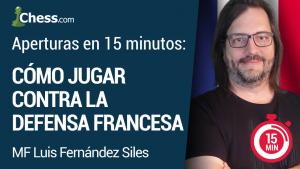
Cómo jugar contra la Defensa Francesa... ¡en 15 minutos!
Continuando con la serie Aperturas de ajedrez en 15 minutos os propongo una línea bastante agresiva contra la Defensa Francesa: la Variante del Avance. Con ella ganamos espacio en el centro muy pronto y preparamos la búsqueda de inic... -
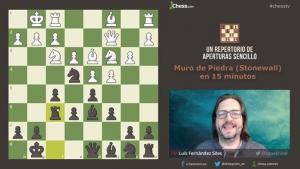
El Muro de Piedra en 15 minutos
El Sistema Stonewall, conocido como Muro de Piedra, es la última de mis recomendaciones en la serie Aperturas de Ajedrez en 15 minutos. Ya comenté en el vídeo y artículo Las 5 defensas más sólidas sanas y ... -
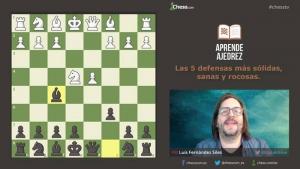
Las defensas más sólidas, sanas y rocosas
No todo el mundo busca una partida de ataque desde las primeras jugadas. Así que... si eres de los que les gusta evitar las complicaciones en las aperturas quieres simplemente llegar a una posición sana y segura (con negras)...... -
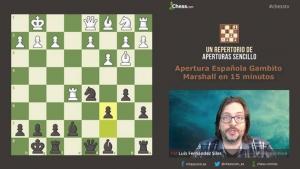
El Gambito Marshall de la Apertura Española en 15 min
La Apertura Española, también conocida como Ruy Lopez, es una de las más antiguas y también una de las más ricas estratégicamente. A partir de esta apertura se pueden llegar a muchos tipos de centro difere... -
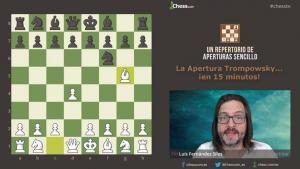
La Apertura Trompowsky... ¡en 15 minutos!
Se trata de una opción muy interesante con la que sacar al negro de las posiciones habituales del peón de dama. En los últimos tiempos hemos visto jugar la Apertura Trompowsky incluso a Magnus Carlsen, lo cual no debe resultar... -
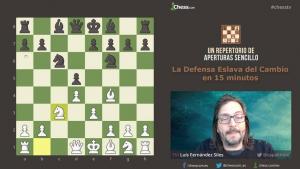
Aprende a jugar contra la Defensa Eslava... ¡en 15 min!
Con la Defensa Eslavalas negras ponen en juego un sólido planteamiento frente al Gambito de Dama. Existen diferentes caminos para tratar de combatirla, pero en el vídeo que acompaña a este artículo te proponemos l... -

Las 5 aperturas de ajedrez más agresivas y sorprendentes
Si te gustan las emociones fuertes en la apertura y buscas opciones agresivas para comenzar tus partidas de ajedrez de una manera sorprendente y aguda... ¡no te pierdas este ranking! Te muestro algunas de las aperturas de ajedrez más ... -
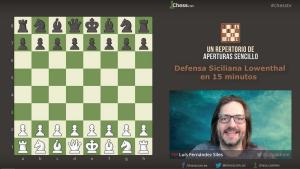
La Defensa Siciliana Lowenthal en 15 minutos
La Defensa Sicliana es una de las opciones más populares dentro de las aperturas de ajedrez. Contiene muchas variantes, como la Najdorf, Paulsen, Scheveningen, Dragón, etc, etc... Hoy te presento una de las variantes menos conocidas ... -
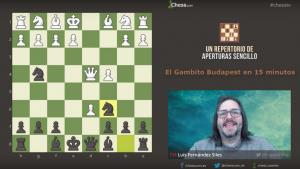
Aperturas de ajedrez en 15 min: El Gambito Budapest
El Gambito Budapest es de los pocos planteamientos de apertura que, pese a contener muchos trucos, celadas e ideas de ataque, no cuenta con una refutación. Y es que la mayoría de gambitos arriesgados que tratan de
Artículos > Medio juego
-
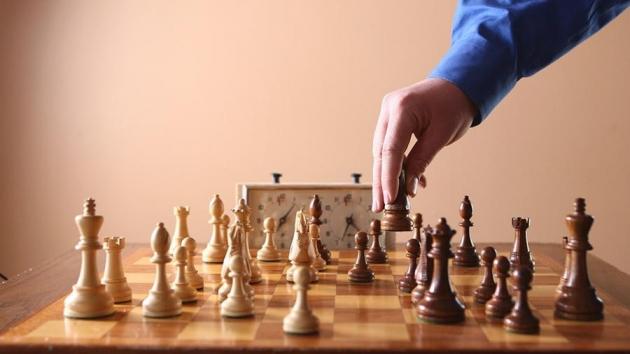
Cómo ganar al ajedrez gracias a la iniciativa
Un concepto particularmente importante en ajedrez es el de iniciativa. Si entendemos su significado y aprendemos a usarla contaremos con un elemento fundamental en la partida de ajedrez. En este artículo trato de explicarte qué es la... -
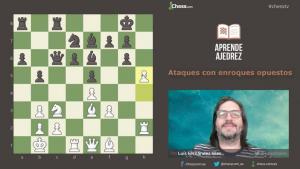
Cómo atacar en posiciones de enroques opuestos
Para mejorar en ajedrez es muy importante conocer diferentes tipos de posiciones. Lo que más define el carácter de una posición es la situación de los reyes, el tipo de centro o los detalles de la estructura de peones. ... -

Your Games Analyzed
There's much to learn in the analysis of your own games. Perhaps equally effective is dissecting the successes and failures of your peers. In this series, watch as GM Magesh Panchanathanand WGM Tatev Abrahamyanreview a pool of games fr... -

A Rare And Brutal Rook Configuration
Once in a while, a game grabs my attention due to some amazing positional concept or, less often (I say “less often” since most tactics are rather repetitive), due to a really interesting tactical battle. Usually you’ll see these... -

Windows Of Chess Opportunity
In an amateur chess game, opportunities abound. Unfortunately, these opportunities are often missed. Positional gains are snubbed, tactics are missed, a winning endgame is agreed drawn, and mutual fear leads both players into a deep, dark abyss.&n... -

Confused Bishops And Drunk Knights
Just recently I have become a bit obsessed with strange andpeculiar chess movesoriginating from knights and bishops. In my first article for Chess.com I took a look at what can be calledThe Nimzowitsch Knight Dance,and in t... -

Lasker's Chess Wisdom
The second world champion in chess history, Emanuel Lasker, was a unique person. Besides being the champion for 27 years (this record will never be beaten for sure!), he was also a famous mathematician and philosopher. In his prime Lasker ... -

The Art Of Chess Defense
Every chess player has a unique style, his own tendencies and preferences. But one attribute is common to all elite grandmasters:tenacity. Consider Magnus Carlsen's performance at the 2015 Gashimov Memorial. In the first round, Magnus conf... -

Mastering Opposite-Colored Bishops
As beginners, we are taught a litany of strategic precepts that inform our thought process and shape our general understanding. "Occupy the center," "knights before bishops," "the rook's place is behind the passed pawn"— all of thes... -

Tips to Improve Your Calculation
Many of my friends who lost control in their calculation, once said: "I can't calculate for next eight moves forward, all i can do is only five moves forward" So, in this short article i will give some tips to improve your calculation technique. ... -

Mamedyarov-Nakamura: Tactical considerations overpowering strategic factors.
I find the position above in yesterday's Mamedyarov-Nakamura game very interesting. I have started writing Everyman's Move by Move books for intermediate players (and above...hopefully) and one major component of the job is to ex... -

A Week in Chicago, Part 2
In last week's article, A Week in Chicago, Part 1, we saw a very strange and interesting game I played against the young FM Eric Rosen in a Chicago international tournament. Now let's look at what happened later in the tournament. As I said befo... -

A Week in Chicago, Part 1
I recently participated in an IM norm tournament in Chicago. This was an unusual kind of tournament for me - and you might find it strange that a tournament for international master norms would have grandmasters. Most of the tournaments in which I... -
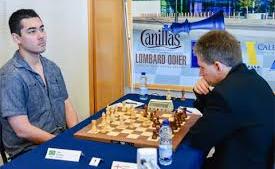
The Pearl of Gibraltar
Recently I was fortunate enough to watch the live transmission and analyze one fantastic game from the Gibraltar Masters beetween my countryman Alexandr Fier and Top GM Michael Adams. I analyzed the game trying to guess the moves (by the way, this... -

Positional Methods From Carlsen's Play, The End
Today's article is the last in series of positional methods from Magnus Carlsen's games. Being aware of the World Champion's style it is no surprise that the topic of piece exchanges wraps up this theme. Carlsen is extremely good in this area - he... -

Positional Methods From Carlsen's Play, Part 6
One of the first principles that an early, intermediate-level chess player learns is that rooks on the seventhrank are powerful. In Russian we call the seventh (or second) rank “obzhornyi” (обжорный ), roughly translating into &l... -

Positional Methods From Carlsen's Play, Part 5
When talking about the topic of positional play we cannot omit the theme of Exchange sacrifice. This positional idea was especiallypopular with World Champion Tigran Petrosian. In modern practice I've seen many Exchange sacrifices in Kramnik... -

Positional Methods From Carlsen's Play, Part 4
Today's article is inspired by a trend in media posts - calling Carlsen's play in theWorld Championship match “nettlesome” - his opponents tend to make more mistakes when playing him compared to their play vs. the other opponents... -

Positional Methods From Carlsen's Play, Part 3
Today's article is a continuation of my series on positional play from the current World Champion's practice. Carlsen is a brilliant chess player and uses diverse positional weapons to win his games.In the first installment we saw his master... -

Positional Methods From Carlsen's Play, Part 2
Carlsen's ability to improve pieces is exceptional. In last week's article we explored some of the diagonal piece maneuvers from the new world champion's practice. Either a queen or a bishop moved to a more active position, so that another piece c... -

Positional Methods From Carlsen's Play, Part 1
This article introduces new series of articles dedicated to the magnificent play of our current world champion - Magnus Carlsen. A series of five or more articles will span different positional and tactical ideas that Carlsen effectively uses in h... -

Heritage in Modern Play, End
We will wrap-up this series about heritage in modern play by looking at one more position with a typical pawn structure. This position can arise from many different Queen's Gambit openings after massive pawn exchanges in the center where both side... -

Heritage in Modern Play, Part 8
Last week we studied how to fight against hanging pawns. Particularly, we looked at games where White, playing againsthanging pawns, tries to first undermine them with e4- or/and b4-breaks and then attack or blockade these hanging pawns. Thi... -

Heritage in Modern Play, Part 7
The topic of how to play against hanging pawns have been examined in numerous books. There are plenty of classical examples from the past showing the effective methods of exploiting the weaknesses of the hanging pawns. These pawns are weak b... -

Heritage in Modern Play, Part 6
In chess, like in life, there are common beliefs that are not necessarily true or based on solid evidence but nevertheless survive the passage of time and continue to be widely accepted as true. Growing up in a "chess

No hay comentarios:
Publicar un comentario